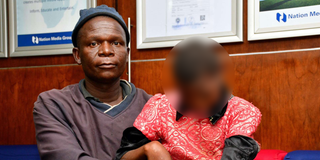Inside a father’s unyielding quest to educate his special needs daughter

Joseph Otieno with his daughter Juliet Auma, who is living with an intellectual disability, during an interview at the Nation Center in Nairobi. He is seeking help to get educate his daughter.
Joseph Otieno looks downcast. He has the face of a man clinging to glimmers of hope that someone will help bear the weight he carries, if only for a little while.
He says that in 2013, his wife died after a long battle with cervical cancer, leaving him as his daughter’s sole caregiver. His daughter, Juliet Auma, lives with an intellectual disability. She cannot speak, she is living with epilepsy and experiences prolonged convulsions, and she lacks control of her bowel movements.
And for the past four years, Mr Otieno has been on a mission to get Juliet Auma admitted into a Special Needs school.
He says he has visited Mathari Hospital, Mama Lucy Kibaki Hospital and even the Kenya Institute of Special Education to try and get a disability assessment report but each of his attempts have been futile.
Registration through the National Council for Persons with Disabilities allows a Person Living with Disability (PLWD) to access various benefits accorded to them by the government including educational bursaries, assistive devices, tax exemptions, among others.
These benefits are only accessible to those who have undergone a medical assessment and are found to be living with a disability.
To get the assessment report, an individual is required to visit particular gazetted hospitals for assessment.
After securing an appointment, a medical team assesses the applicant and prepares the report which is then presented to the Director of Medical Services at the county level who verifies and finalises the report.
The applicant then submits a copy to the National Council for Persons with Disabilities for issuance of a Person with Disability Card.
At Mathari, he says he paid the required Sh800 fee but instead of processing the report at the facility, he was instead referred to Mama Lucy Kibaki Hospital.
"I need help, I was in the Governor's office today but I was told he was not around," he says.
The report is critical to ensuring that Juliet can be able to be registered as a person with disabilities before she can access an education grant that covers up to 75 percent of tuition fees and other benefit set aside for people with special needs.
As we speak, Juliet starts to throw a fit and rolls on the ground. He attempts to feed her a bun and water to calm her down in vain. She continues to drool.
He watches helpless for a moment before trying to find something to distract her. A hardcover book settles her down, albeit for a few minutes.
“This is what I have to go through every day and with my job it becomes very difficult. Sometimes, I skip work to just stay with her,” he says.
Mr Otieno, who lives at Baba Dogo in Nairobi’s Eastlands, is a hawker who sells groundnuts within the City. In a day, he says, he makes Sh200 to Sh300.
He points out that this is barely enough to take care of his other seven children and to get Juliet into a private special needs schools.
However, the lack of funds has not stopped him from trying.
In 2020, he tried to enrol Juliet into a private Special School in Siaya but management challenges ensued and the school refused to admit her citing lack of caregivers to look after female learners.
Mr Otieno remarried but he says his wife is not keen on helping with Juliet forcing him to sometimes tag Juliet along wherever he works - the only way he is assured of her safety.
Still, he sometimes feels like giving up.
"Some people have asked me to go and drop her off at KNH and disappear but I could never live with myself if I did that," he said.
Due to high stress levels, he says he has since developed high blood pressure. Now he only wants to get Juliet in school.
Aside from perhaps learning the most basic functions, he believes she will be much safer there. And with his mind at ease, he will be able to work hard to fend for his other children.
He can be contacted on 0725812518.





